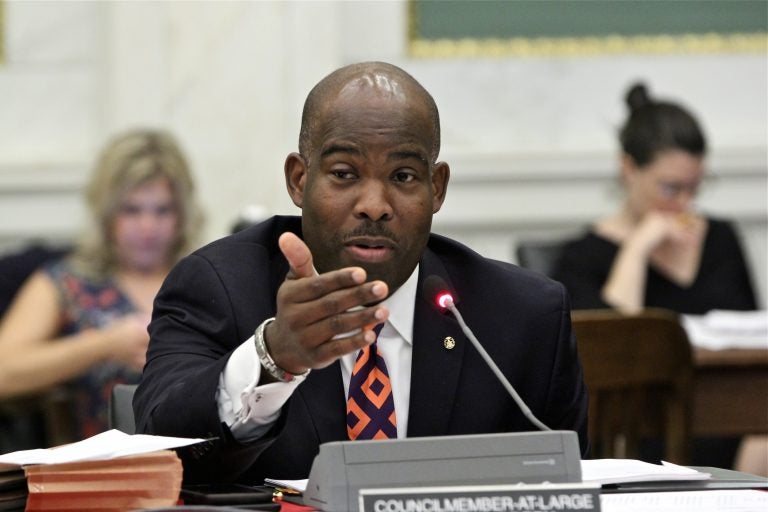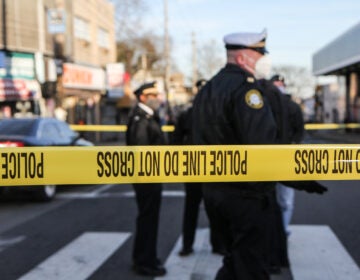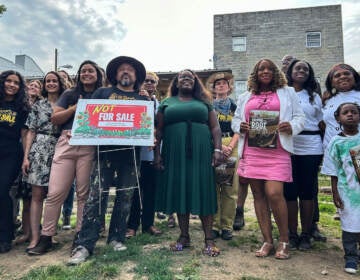A ‘progressive’ approach to taxing land gains traction in Philly Council
After years of drama over unfair property taxes, Council considers a land tax that advocates believe could lower assessments for some property owners.

Philadelphia City Councilmember Derek Green speaks during a hearing on a bill that would guarantee legal counsel for those facing eviction. (Emma Lee/WHYY)
City Council is considering a new approach to taxing real estate that advocates believe could lower assessments for less affluent property owners without reducing the city’s overall haul.
“We need to look at how we can grow out of poverty, especially for businesses of color, ” Councilmember Derek Green said at a hearing he spearheaded on the feasibility of a so-called land value tax.
Green believes now is the time to rethink Philadelphia’s approach to property taxes, after a pandemic year that cost the city hundreds of millions in lost wage and business tax revenue and raised significant questions about the wisdom of relying on those streams in a world where remote work is increasingly an option. Without $1.4 billion in federal aid delivered by President Biden’s America Rescue Plan, the city would have faced significant budget shortfalls.
Philadelphia “needs to be looking at how we do taxation in our city, especially considering the significant impact that the pandemic had on the economic fortunes on the city,” Green said.
Unlike a traditional property tax, land value tax is assessed based on the value of a piece of land, rather than the value of the “improvement” or building. Instead of seeing taxes rise and fall based on the condition of a building, a property owner pays based on the value of the location, taking into account public infrastructure and other nearby assets. Advocates describe the approach as “progressive” and believe it discourages speculation and blight while lowering the tax burden for property owners in areas with less public investment and lower market values.
That issue of equity has haunted the city’s ongoing effort to overhaul the city’s property tax system. A 2019 report from the city’s Controller Office found the city’s Office of Property Assessment does a “worse job” assessing properties in areas with lower home values. “Less expensive homes in these areas tend to be over-assessed relative to more expensive homes,” stated the report from City Controller Rebecca Rhynhart. Higher tax assessment translates to greater tax burdens, which means lower-income residents are “likely paying more than their fair share of property taxes.”
City assessors have particularly struggled to get the numbers right in West Philadelphia, Southwest Philadelphia, and North Philadelphia, according to the Controller’s report. These sections have more regressive and less uniform assessments while also having the lowest median income in the city, ranging from $18,000 in North Philadelphia to $26,000 in West Philadelphia, Rhynhart’s office found.
If Philadelphia shifted to a 50-50 ratio of tax on buildings and land, homeowners across the city would see a collective savings of more than $60 million each year, according to Josie Faass, the executive director of the Robert Schalkenbach Foundation, which promotes property tax reform as a vehicle for economic justice and equity.
With a true land tax, that figure could jump to $123 million. The folks who would pick up the slack would be speculators and absentee owners of vacant land, according to proponents of the economic theory.
Stephen Mullen, an economics expert at Econsult Solutions, said he’s supportive of the idea of implementing a partial land value tax program, which would mean phasing in a more heavily weighted land component each year.
“If combined with certain regulatory changes and zoning changes, it would lead to significant increases in capital investment in the city’s commercial and residential buildings, which means a greater supply,” Mullen said.
Within City Hall, the Kenney administration is more circumspect about the theory. Philadelphia’s Revenue Commissioner and Chief Commissions officer Frank Breslin said making the switch would open up a can of legal worms while threatening the city’s financial stability.
He said the city doesn’t have the authority to enact a land value tax and could be forced to refund all taxes if the approach was found to be unconstitutional.
“If we enacted such attacks and lost in court, it is possible that the entirety of real estate tax revenue for both the General Fund, and the school district could be in jeopardy for the tax year in question,” Breslin said.
Mayor Jim Kenney’s budget proposal for this year includes tax cuts for both wage and business taxes.
According to Steven Wakefield, a deputy city solicitor, there are 14 jurisdictions in Pennsylvania that have a land value tax after obtaining authorization from the state for the reform. Allentown and Harrisburg have a form of split-rate taxation where there are two different property tax rates, one for buildings and improvements and the other for land value.
Meanwhile, the Kenney administration is not reassessing properties for tax years 2021 or 2022 because of delays in a planned rollout of a new Computer Assisted Mass Appraisal System (CAMA). The new system was promised in 2013 to help improve the accuracy and uniformity of property assessments.
 WHYY is one of over 20 news organizations producing Broke in Philly, a collaborative reporting project on solutions to poverty and the city’s push towards economic justice. Follow us at @BrokeInPhilly.
WHYY is one of over 20 news organizations producing Broke in Philly, a collaborative reporting project on solutions to poverty and the city’s push towards economic justice. Follow us at @BrokeInPhilly.

Subscribe to PlanPhilly
WHYY is your source for fact-based, in-depth journalism and information. As a nonprofit organization, we rely on financial support from readers like you. Please give today.









